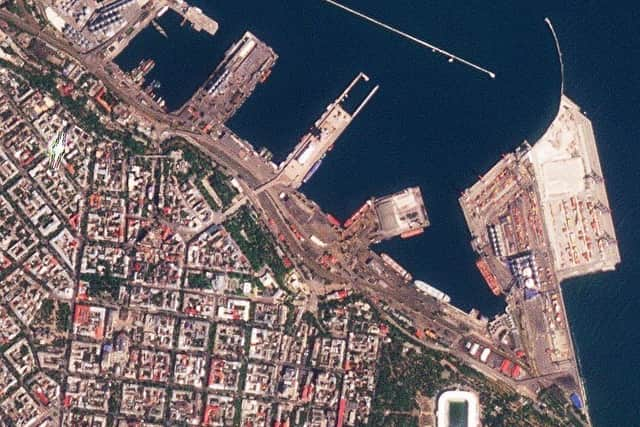Ukraine-Russia: First grain ship leaves Ukrainian port of Odesa under Russian deal
The Sierra Leone-flagged cargo ship Razoni left Odesa carrying more than 26,000 tons of corn destined for Lebanon.
“The first grain ship since Russian aggression has left port,” said Ukraine’s Minister of Infrastructure Oleksandr Kubrakov on Twitter, posting a video of the long vessel sounding its horn as its slowly headed out to sea.
Advertisement
Hide AdAdvertisement
Hide AdPosting separately on Facebook, Mr Kubrakov said Ukraine was the fourth-largest corn exporter in the world, “so the possibility of exporting it via ports is a colossal success in ensuring global food security”.


“Today Ukraine, together with partners, takes another step to prevent world hunger,” he said.
In Moscow, Kremlin spokesman Dmitry Peskov hailed the ship’s departure as “very positive”, saying it would help test the “efficiency of the mechanisms that were agreed during the talks in Istanbul”.
Turkey’s defence minister Hulusi Akar said the Razoni is expected to dock on Tuesday afternoon in Istanbul at the entrance of the Bosporus, where joint teams of Russian, Ukrainian, Turkish and UN officials will board it for inspections.
In an interview with Turkey’s state-run Anadolu Agency, Mr Akar warned the global food crisis threatened to trigger “a serious wave of migration from Africa to Europe and to Turkey”.
The corn will then head to Lebanon, a nation in the grip of what the World Bank has described as one of the world’s worst financial crises in more than 150 years.
A 2020 explosion at its main port in Beirut shattered its capital city and destroyed grain silos there, part of which collapsed on Sunday after a weeks-long fire.
The Turkish defence ministry said other ships would also leave Ukraine’s ports through safe corridors in line with deals signed in Istanbul on July 22, but did not provide further details.
Advertisement
Hide AdAdvertisement
Hide AdRussia and Ukraine signed separate agreements with Turkey and the UN clearing the way for Ukraine — one of the world’s key exporters — to export 22 million tons of grain and other agricultural goods that have been stuck in Black Sea ports because of Russia’s invasion.
The deals also allow Russia to exports grain and fertiliser.
Turkey’s defence minister praised a joint co-ordination centre staffed by Russian, Ukrainian, Turkish and UN officials as a venue where opposing sides can engage with each other.
“The problems they have are obvious, there is a war,” Mr Akar said. “But it is the only place where the two sides are able to come together. Despite the ups and downs, there is a good environment for dialogue.”
Ukraine’s infrastructure ministry said 16 more ships, all blocked since the beginning of Russia’s full-scale invasion of Ukraine on February 24, were waiting their turn at Odesa.
Mr Kubrakov said the shipments would also help Ukraine’s war-shattered economy.
“Unlocking ports will provide at least $1 billion in foreign exchange revenue to the economy and an opportunity for the agricultural sector to plan for next year,” he said.
The UN welcomed the development, saying secretary-general Antonio Guterres hoped the shipments would “bring much-needed stability and relief to global food security especially in the most fragile humanitarian contexts”.
Comments
Want to join the conversation? Please or to comment on this article.